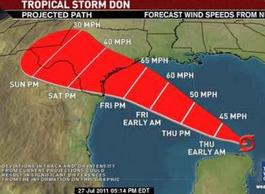 Tropical Storm Don earned respect when she earned her name on Wednesday. Tropical Storm Don is expected to make landfall in southeastern Texas on Friday.
Tropical Storm Don earned respect when she earned her name on Wednesday. Tropical Storm Don is expected to make landfall in southeastern Texas on Friday.
This should serve as a reminder to all of us here in South Florida that tropical depressions, or areas of intense thunderstorms that gather in the tropics, become named tropical storms when they reach sustained wind speeds of 39 mph.
Understanding how storms are characterized can assist homeowners in knowing what to expect. However, our Miami hurricane damage lawyers caution homeowners against becoming complacent in cases where a tropical storm fails to become a hurricane, or when a hurricane fails to climb the charts.
The act of rating a storm can actually be dangerous when it leads to such complacency. The storm-classification system is designed to assist South Florida residents in understanding what to expect — as long as they understand that, in all cases, a storm carries the risk of serious property damage and the potential for serious or fatal injury when residents fail to take the proper safety precautions.
Tropical storms, such as Don, have wind speeds of 39 to 73 miles an hour and are associated with torrential rains, localized flooding, downed trees and power lines and the possibility of structural damage, particularly to older buildings or mobile homes.
A tropical storm reaches hurricane strength when winds climb above 74 miles an hour and are categorized on a scale of 1 to 5 until the winds reach roughly twice that speed. Anything with sustained winds of more than 155 mph is considered a Category 5 hurricane. Katrina was a Category 5 storm when it hit New Orleans and Andrew was a Category 5 storm when it devastated South Florida in 1992.
Florida Today provides a nice graphic illustration.
Category 1: Minimal Hurricane
Winds: 74 to 95 miles per hour
Storm surge: Up to 5 feet
Damage: Some trees and power lines may be down; damage caused by flying debris; localized flooding; those in mobile and modular homes are at greatest risk.
Category 2: Moderate Hurricane
Winds: 96 to 110 miles per hour.
Storm Surge: 6 to 8 feet.
Damage: Downed trees and power lines; some flooding; debris damages; structural damage possible, particularly in older homes. Mobile and modular homes at great risk.
Category 3: Extensive Hurricane
Winds: 111 to 130 mph
Storm Surge: 9 to 12 feet
Damage: Widespread flooding possible. Significant structural damage to homes and buildings possible. Downed trees and power lines. Probable destruction of mobile and modular homes.
Category 4: Extreme Hurricane
Winds: 131 to 155 mph
Storm Surge: 12 to 18 feet
Damage: Widespread destruction of homes and buildings, structural damages and roof loss are common, significant flooding and storm surge risk, higher likelihood of significant time without power.
Category 5: Catastrophic Hurricane
Winds: Greater than 155 miles per hour
Storm Surge: 18 feet
Damage: Widespread destruction
The important thing to keep in mind when considering a storm’s rating is that all of these storms can cause significant property damage and can lead to the risk of serious or fatal injuries. This weekend’s tropical storm, in Texas, with winds of 40 miles per hour, is roughly twice as powerful as our typical violent summer weather. A minimal category 1 hurricane is four times as powerful as a typical summer storm.
—–
EXTENDED BODY:
If you are facing a dispute over an insurance claim in South Florida, contact Alvarez & Barbara, LLP toll free at 866-518-2913 for a free and confidential consultation to discuss your rights.